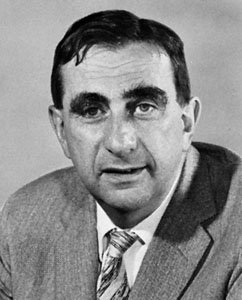User:Jhaines7
Edward Teller
Contents [hide]
1 Personal Life 2 Scientific Contributions 2.1 Manhattan Project and the Hydrogen Bomb 2.2 Issues with Oppenheimer and Defense Advocate 3 Connectedness 4 History 5 See also 6 References Personal Life[edit]
Edward Teller was born in 1908 in Budapest, Hungary. Peculiarly, he begin speaking later than most children, but became very interested in numbers, even calculating large numbers for fun. Teller graduated with a bachelor's in chemical engineering and received his Ph.D in physics under Heisenberg at the University of Leipzig. Professor George Gamow invited Teller to the United States to become a physics professor at George Washington University, where he worked until 1941. Here, Teller predicted the Jahn-Teller Effect, which describes the behavior of chemical reactions of metals, and the coloration of metallic dyes, and contributed to the BET isotherm, a fundamental background of surface physics. When World War II began, Edward Teller began working to contribute to the war effort.

Scientific Contributions[edit]
Manhattan Project and the Hydrogen Bomb[edit]
In 1942, Teller was invited to be part of Robert Oppenheimer's plans for the origins of the Manhattan Project. Teller began working with Leo Szilard at the University of Chicago, later heading a group at Los Alamos in the Theoretical Physics division in 1943. However, Teller's obsession with the hydrogen bomb caused tensions with other scientists. In 1946, Teller returned to the University of Chicago. It was not until the Soviet Union detonated the first atomic bomb, that Teller received permission from Truman, and began gathering scientists to start research on the first hydrogen bomb. Again, he returned to Los Alamos to work on his designs. However, he was not selected as the division leader, and so tensions began between him and the scientists as Los Alamos. In 1951, Teller collaborated with Polish mathematician Stanislaw Ulam to conjure up with the first design for a thermonuclear device. A year later, the United States tested it at Eniwetok Atoll. Called The Mike Shot, the bomb yielded 10 megatons of TNT and was 1000 times larger than the atomic bomb dropped on Hiroshima.

Anti-Nuclear Initiatives[edit]
Teller testified against J. Robert Oppenheimer, labeling Oppenheimer as a security risk. This created deep ruts between Teller's scientists at Los Alamos and the United States, who saw Oppenheimer as an image of loyalty and freedom. For example, during the Vietnam War his proposals infuriated protestors against the war to such a degree that some of labeled him a war criminal. He became a major proponent of investigating non-military uses for nuclear explosives, and visited Israel as their main advisor on nuclear matters. Teller continued to be a tireless advocate of a strong defense policy, demanding the development of more advanced thermonuclear weapons and continued testing. In the 1980s, he was a staunch supporter of the new defense system known as the Strategic Defense Initiative, which became known in the media as Star Wars.

Connectedness[edit]
How is this topic connected to something that you are interested in? I have always been fascinated at the level of intelligence and ingenuity required in such stressful times during World War II to invent the atomic bomb. It is no wonder Oppenheimer, Einstein, and Teller were seen as heroes and symbols of freedom and justice in the world. In addition, the awesome power of the thermonuclear weapon is really fascinating and impressive that so much destructive power could exist. How is it connected to your major? As a chemical engineer, I am involved in work with chemical elements, reactions, material and energy balances, and fission. Is there an interesting industrial application? Weaponry and military science and engineering are a huge and ever growing field. As Teller had been, there will always be the need for a solid and well grounded defense policy. History[edit]
Edward Teller provided a foundation for weaponry and ethics in military weapons. He also began initiating awareness on peaceful uses for atomic weapons as in Project Plowshare.
See also[edit]
See J. Robert Oppenheimer for further research on the Manhattan Project.
References[edit]
Edward Teller Britannica Edward Teller The American Experience Atomic Heritage Foundation Edward Teller